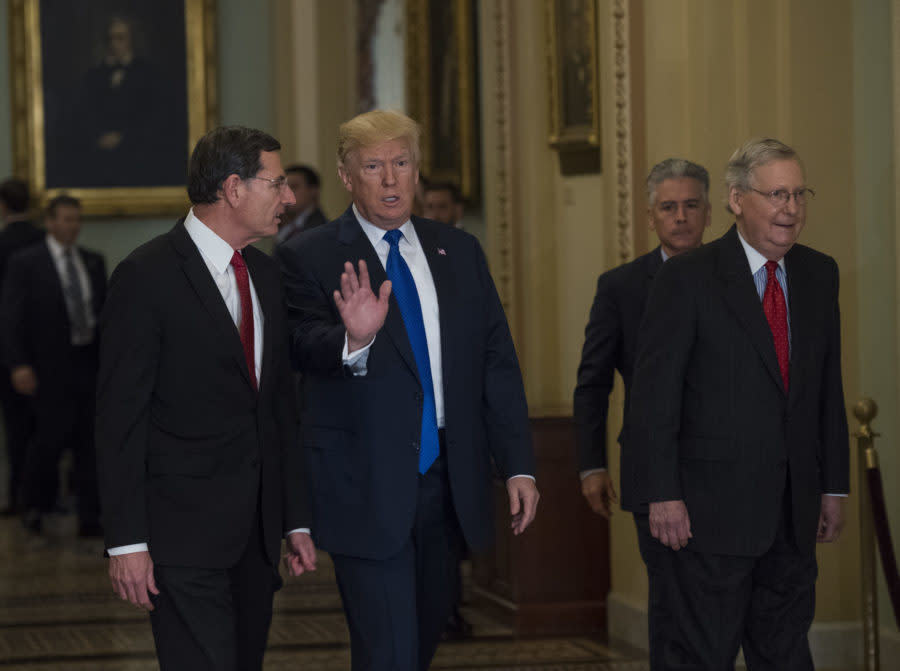Many Republicans don’t support the tax bill, but they keep moving it forward
The Senate tax bill went through a familiar cycle on Tuesday. In the morning, Republican lawmakers raised doubts about it that seemed irreconcilable. In the afternoon, they voted for it.
The Senate Budget Committee voted 12-11 along party lines to move the bill forward, allowing it to hit the Senate floor later this week, with the support of two Republicans who had criticized it hours before: Sens. Bob Corker of Tennessee and Ron Johnson of Wisconsin.
It’s a cycle that, so far, has kept hope alive on a bill that has raised concerns among both deficit hawks and those who wish it cut taxes further, while attracting no Democratic support so far, all while facing broad skepticism among the public. (Just 25% of respondents approved of the plan in one recent poll.)
The most contentious issue within the Republican conference is the bill’s impact on the debt and deficit. Those who support it have repeatedly said that its sweeping tax cuts — many of which disproportionately benefit the wealthy — won’t hike the national deficit by more than $1.4 trillion over the next decade, but a number of deficit hawks are skeptical.
#Breaking: John McCain to vote for GOP tax bill https://t.co/1xVhOfx777 pic.twitter.com/ESjVjjpe8z
— POLITICO (@politico) November 30, 2017
Related article: The tax reform bill could hurt wind and solar power
At least four Republican Senators — Corker, and also Sens. Jeff Flake of Arizona, James Lankford of Oklahoma, and Todd Young of Indiana — have expressed concerns that the bill will cost much more, and when it does, that Congress won’t act to rectify the situation.
The solution that some of them are calling for is simple: a so-called “trigger mechanism” that will reign in tax cuts if economic growth under the tax reform bill doesn’t meet forecasts.
“We’ve got to be able to make it where a backstop is set up and people aren’t afraid of it,” Lankford told reporters late Tuesday afternoon. “And you hope it’s never used! It’s only designed for if we’re not hitting revenue totals and we’re kicking in more deficit.”
But snark from other Senate Republicans suggests that this isn’t something that will be added easily to the bill.
“I am not going to vote to automatically implement tax increases on the American people,” Sen. John Kennedy of Louisiana said. “If I do that, consider me drunk.”
These conflicts were the subject of discussion at a weekly luncheon of Senate Republicans on Tuesday, which President Trump attended. There, he seemed amenable to adding the trigger mechanism, according to Bloomberg.
“I wish you could have been inside that room,” Trump said later in the day. “It was very, very special — the camaraderie. It was somewhat of a lovefest.”
The Senate version of a sweeping GOP tax overhaul could be headed for final passage this week. Senators voted last night along party lines, 52 to 48, to start debate on the bill. No Democrats support the package: https://t.co/MdkvYfBinD pic.twitter.com/1JRbvs9vWc
— CBS This Morning
(@CBSThisMorning) November 30, 2017
Related article: John McCain just gave the Republican tax bill a big boost
Maybe so. But the stark truth is that Republicans, who hold a slim majority of 52 seats in the Senate, can afford to lose just two votes in order to pass the bill along party lines. In an interview with TIME earlier this month, Flake said he would not vote for a bill that would balloon the deficit.
“We can do tax reform in ways that will grow the economy but we can’t just ignore the debt and deficit,” he said.
Republican lawmakers have not yet unveiled specific tweaks to the bill that will appease its skeptics. Two Republican Senators who previously spoke out against it on the grounds that it harmed small businesses, Johnson and Sen. Steve Daines of Montana, seemed only somewhat less ambivalent on Tuesday. Johnson’s “yes” vote in committee served only “to keep moving the process along,” a spokesperson told Axios.
There’s also Sen. Susan Collins of Maine, a moderate Republican who has criticized the bill’s repeal of Obamacare’s individual mandate. She has called for a compromise: support for the so-called Alexander-Murray bipartisan bill, named for its sponsors, Sens. Lamar Alexander of Tennessee and Patty Murray of Washington, that would stabilize insurance marketplaces. Trump reportedly said he would support the legislation, though in the past he’s spoken out in harsh terms against it.
The margins are thin. The bill in its current form is unlikely to get any Democratic support: even moderates from red states, such as Sen. Joe Manchin of West Virginia, have called for additional compromises first. And lawmakers farther to the left are apoplectic.
“It gives huge tax breaks to the people who need it the least — the very very wealthy,” Sen. Bernie Sanders of Vermont, the ranking member on the Senate Budget Committee, said during the hearing on Tuesday. “I have not the slightest doubt that this bill if, God forbid, it is passed, the Republican leadership is going to come back and say ‘oh, we need to deal with the deficit’ — and then they’ll cut Social Security, Medicare, Medicaid, and education.”
But despite the criticism of the bill from inside and outside the Republican caucus, it keeps moving along.

